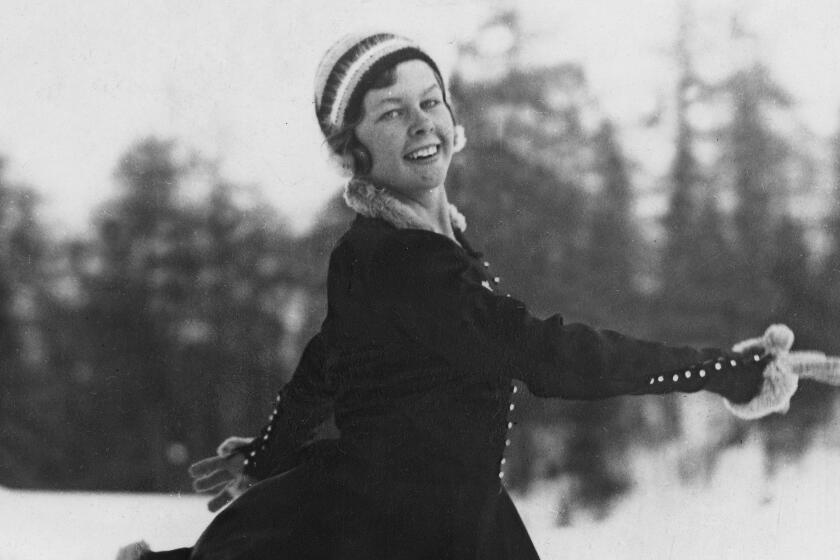L.A. Should Establish Fiscal Ground Rules With NFL
The kind of tough love Los Angeles practiced on the International Olympic Committee during the negotiations for the 1984 Games should have been employed long ago by L.A. with the NFL.
It’s certainly no favor to a negotiating adversary not to let it know, at the first opportunity, what the irreducible conditions are in your own negotiating position.
If there’s something you won’t do under any circumstances, or is just plain not feasible for political reasons, let the other side know, so it can get used to the idea. Then, maybe, it will eventually accept it.
That was the key to successful dealing by Los Angeles Olympic organizers with the IOC.
The NFL hasn’t been told unequivocally that there will be little or no public money put up to bring pro football back to Los Angeles. It should have been informed years ago.
This is the condition Olympic organizers laid down to the IOC. There was no way the Tom Bradley administration was going to accept municipal liability for the 1984 Games. It wanted to vest it in a private committee. Polls showed the public strongly backed that concept. In fact, there was no way the 1984 Olympics were going to come to L.A. on any other basis.
For months during the contractual negotiations in 1978, despite being told no early and often, the IOC tried to foist on Los Angeles its rule holding the city government liable for all 1984 debts. It resisted believing it couldn’t get its way.
It was not until July 18, 1978, when Mayor Bradley asked the City Council to drop the Olympic bid, that the IOC leadership realized Los Angeles meant business. It took the late Lord Killanin, then the IOC president, only one day to blink.
Killanin asked for a renewal of negotiations, and, in time, the IOC signed a contract accepting a private committee and absolving the city government of liability.
The ironic thing after all the fuss was that the Games were highly profitable. The IOC should have spent its time negotiating a share of the profits.
As the Los Angeles Times reporter covering the Olympic bid, I had a front-row seat for the proceedings.
It seemed to me a good idea from the very beginning to talk bluntly to the aristocratic Olympic leadership about the only conditions L.A. would agree to for bringing the Games here. There were people among the local boosters who felt IOC members were such nobility they would not listen to plain language. But it always seemed to me they would, and what amounted to Bradley’s ultimatum finally did work.
But plain talk to the NFL has been lacking for four years, since the Raiders foolishly moved back to Oakland. If L.A. people haven’t gone to the high and mighty owners on tippy-toes, they still haven’t clearly let them know the political lay of the land here either.
The fact is, there is no appreciable political support, either on the city, county or state level, for public money to bring back pro football. There was in Cleveland and Baltimore, but these cities aren’t Los Angeles. Furthermore, it is not likely to develop here.
By not saying that, bluntly and repeatedly, the matter of public money has been left, in the NFL owners’ minds, in limbo. Often, financing has been the last thing discussed, when it should have been the first. We have heard numerous proposals of alternatives with nothing being said that they would have to be financed the only way they could be, privately.
NFL owners have accordingly been able, through wishful thinking, to imagine they will eventually get public money.
And so, the whole matter of getting a team here has been delayed.
That was no favor to L.A., and no favor to the NFL either.
It’s sure to take time for the NFL leadership to accept the no-public-money condition and lower its financial sights, which are now beyond reason. So it’s all the more important that our negotiators make a start.
Marshal Lyautey, the French colonial commander, once told a Moroccan servant to plant a tree the next morning.
But, the servant replied, this tree won’t produce fruit for 100 years.
In that case, better plant it this afternoon, Lyautey replied.
It may take a long time yet for pro football to return to Los Angeles. When the NFL owners hear the truth, they may decide to go to Houston for now. But eventually, I believe, they will meet Los Angeles’ terms, or a private entrepreneur will step into the breach.
It is time we begin to talk realistically to the NFL. Not until we do will the terms for football coming back be put on a sound course.
More to Read
Go beyond the scoreboard
Get the latest on L.A.'s teams in the daily Sports Report newsletter.
You may occasionally receive promotional content from the Los Angeles Times.






